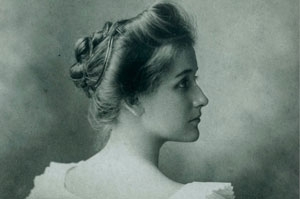For almost half a century, Washington College’s Sophie Kerr Prize has been awarded to a graduating senior exhibiting “the most ability and promise for future fulfillment in the field of literary endeavor.”
The prize has been a highlight of every graduation weekend except for the last four when it was relocated to New York City and Baltimore to attract a larger audience.
This Friday, the $63,000 prize will return to the campus and community.
The Sophie Kerr Prize is the largest literary prize of its kind in the U.S., besting even the Pulitzer Prize and National Book Award.
An Eastern Shore native—she was from Denton—Sophie Kerr found great success in writing fiction, editing many popular magazines and publishing hundreds of short stories, 23 novels, poems and a Broadway play.
In 1942, Washington College gave two honorary degrees to celebrate the 50th anniversary of its co-education—one to Eleanor Roosevelt and the other to Sophie Kerr.
Although she went to Hood College (and the University of Vermont), Kerr decided to leave the majority of her estate to Washington College with an iron-clad directive to give half of its yearly income to a graduating senior with literary talent, and half to fund scholarships, student publications and a reading series given by renowned and emerging writers.
In this video, English Department and Sophie Kerr Committee Chairman Kate Moncrief, talks about the prize, what it means to the College, the student, and to her.
Dr. Moncrief also invites everyone to the award ceremony taking place on Friday, May 15at 7:00 p.m. at the Decker Theatre, Gibson Center for the Arts at Washington College. This year’s winner will be announced by honored guest and 1982 Sophie Kerr winner Peter Turchi after a reading by all finalists.
“This really is a campus and greater community celebration,” Moncrief said. “We extend an invitation to everyone to share this exciting moment.”




Write a Letter to the Editor on this Article
We encourage readers to offer their point of view on this article by submitting the following form. Editing is sometimes necessary and is done at the discretion of the editorial staff.